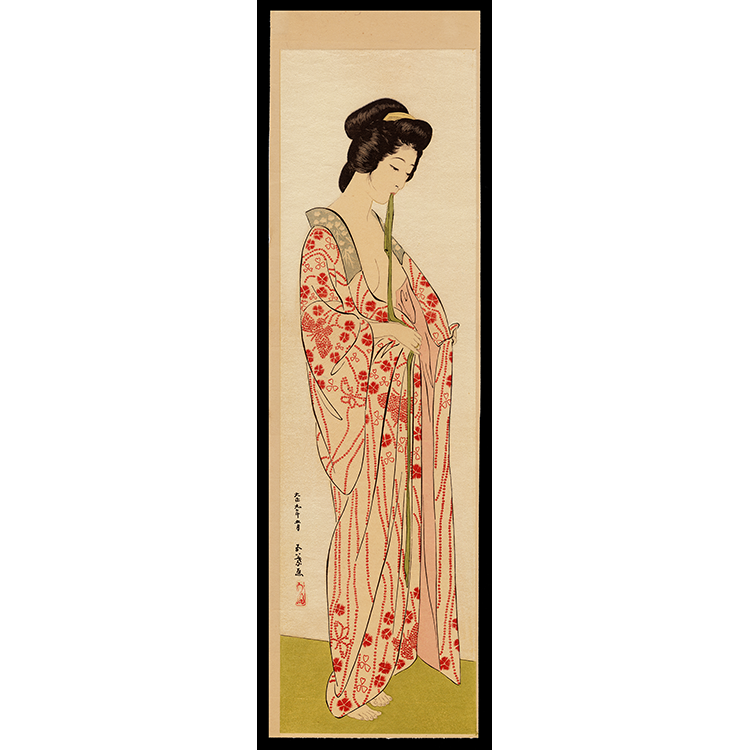<b>SANJO BRIDGE KYOTO</b> / Hashiguchi Goyo1920<b>SOLD</b></em>
ARTIST: Goyo Hashiguchi (1880–1921)
TITLE: Sanjo Bridge, Kyoto
MEDIUM: Woodblock print
DATE: 1920
DIMENSIONS: 11 1/2 x 18 7/8 inches
CONDITION: Faint adhesive residue on reverse top margin, otherwise in excellent shape
NOTE: Lifetime Impression
LITERATURE: Chiba City Art Museum, Goyo Hashiguchi ten, 1995, pl. 39
PROVENANCE: James D. Tobin
SOLD
ARTIST: Goyo Hashiguchi (1880–1921)
TITLE: Sanjo Bridge, Kyoto
MEDIUM: Woodblock print
DATE: 1920
DIMENSIONS: 11 1/2 x 18 7/8 inches
CONDITION: Faint adhesive residue on reverse top margin, otherwise in excellent shape
NOTE: Lifetime Impression
LITERATURE: Chiba City Art Museum, Goyo Hashiguchi ten, 1995, pl. 39
PROVENANCE: James D. Tobin
SOLD
ARTIST: Goyo Hashiguchi (1880–1921)
TITLE: Sanjo Bridge, Kyoto
MEDIUM: Woodblock print
DATE: 1920
DIMENSIONS: 11 1/2 x 18 7/8 inches
CONDITION: Faint adhesive residue on reverse top margin, otherwise in excellent shape
NOTE: Lifetime Impression
LITERATURE: Chiba City Art Museum, Goyo Hashiguchi ten, 1995, pl. 39
PROVENANCE: James D. Tobin
SOLD
Details
Goyo presents the viewer with a striking view of the great Sanjo Bridge, Kyoto’s oldest and most important stone overpass. For more than a thousand years, it served as the city’s main eastern entry point. It was the terminus of the Tokaido Road—the highway that connected the once-capital city of Kyoto with the Eastern provinces. Despite its long history, the 1920s Sanjo Bridge Goyo depicts is thoroughly modern, composed of concrete and steel. Goyo faithfully reproduces the bridge’s gentle slope as it crosses the Kamo River and leads into the center of town. The design’s soft and subtle coloration, in conjunction with the soft snowfall, invokes a sense of timelessness. Indeed Goyo has produced a very capable bridge, in this case carrying the viewer from the modern to a Japan of a bygone era.
Connoisseur's Note
This print was produced by Goyo during his lifetime and bears the distinctive seal of the celebrated Western collector James D. Tobin at the right margin. Tobin assembled arguably the world’s most important collection of 20th-century Japanese prints. It was dispersed in the 1980s, with a large portion of the collection entering many of the world’s finest institutions. Early impressions of this design, like this example, are often seen with irregularly shaped margins.





